《大学英语》课程PPT教学课件(口语一)Unit One Self-introduction
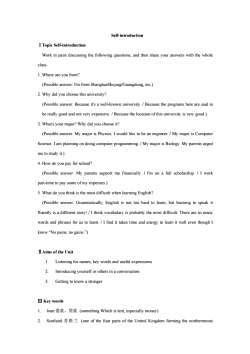
Self-introductionITopic Self-introductionWork in pairs discussing the following questions, and then share your answers with the wholeclass.1.Whereareyoufrom?(Possibleanswer:I'mfrom Shanghai/Beijing/Guangdong,etc.)2. Why did you choose this university?(Possibleanswer:Because it's a well-knownuniversity./Becausetheprograms hereare said tobe really good and not very expensive. / Because the location of this university is very good.)3. What's your major? Why did you choose it?(Possible answer: My major is Physics. I would like to be an engineer. / My major is ComputerScience. I am planning on doing computer programming. / My major is Biology. My parents urgedme to study it.)4. How do you pay for school?(Possible answer: My parents support me financially. / I'm on a full scholarship. / I workpart-time to pay some of my expenses.)5.What do you think is the mostdifficult whenlearningEnglish?(Possible answer: Grammatically, English is not too hard to learn, but learning to speak itfluently is a different story! /I think vocabulary is probably the most difficult. There are so manywords and phrases for us to learn./I find it takes time and energy to learn it well even thoughIknowNo pains, no gains.")IAims of the Unit1.Listeningfornames,keywordsand useful expressions2.Introducing yourselforothers in aconversation3.Getting to know a strangerIIIKeywords1.loan:借款,贷款(somethingWhichislent,especiallymoney)2.Scotland:苏格兰(oneofthefourpartsoftheUnitedKingdomformingthenorthernmost
Self-introduction ⅠTopic Self-introduction Work in pairs discussing the following questions, and then share your answers with the whole class. 1. Where are you from? (Possible answer: I'm from Shanghai/Beijing/Guangdong, etc.) 2. Why did you choose this university? (Possible answer: Because it's a well-known university. / Because the programs here are said to be really good and not very expensive. / Because the location of this university is very good.) 3. What's your major? Why did you choose it? (Possible answer: My major is Physics. I would like to be an engineer. / My major is Computer Science. I am planning on doing computer programming. / My major is Biology. My parents urged me to study it.) 4. How do you pay for school? (Possible answer: My parents support me financially. / I'm on a full scholarship. / I work part-time to pay some of my expenses.) 5. What do you think is the most difficult when learning English? (Possible answer: Grammatically, English is not too hard to learn, but learning to speak it fluently is a different story! / I think vocabulary is probably the most difficult. There are so many words and phrases for us to learn. / I find it takes time and energy to learn it well even though I know “No pains, no gains.”) ⅡAims of the Unit 1. Listening for names, key words and useful expressions 2. Introducing yourself or others in a conversation 3. Getting to know a stranger Ⅲ Key words 1. loan:借款,贷款 (something Which is lent, especially money) 2. Scotland:苏格兰 (one of the four parts of the United Kingdom forming the northernmost
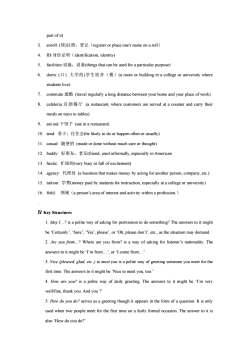
part of it)3.enroll:(使)注册,登记(registerorplaceone'snameonaroll)4.ID:身份证明(identification;identity)5.facilities:设施,设备(thingsthatcanbeusedforaparticularpurpose)6.dorm:(口)大学的)学生宿舍(楼)(aroomorbuildingina collegeoruniversitywherestudents live)7.commute:通勤(travel regularlya long distancebetween your home and yourplace of work)8.cafeteria:自助餐厅(a restaurant,where customers are served at a counter and carry theirmeals on trays to tables)9.eatout:下馆子(eatinarestaurant)10.tend:易于;往往会(belikelytodoorhappenoftenorusually)11.casual:随便的(made ordonewithoutmuchcareorthought)12.buddy:好朋友;老兄(friend,usedinformallyespeciallyinAmerican13.hectic:忙碌的(verybusyorfullofexcitement)14.agency:代理处(a business that makes money by actingfor another person, company,etc.)15.tuition:学费(money paid by students for instruction,especially at a college or university)16.field:领域(aperson'sareaofinterestand activitywithinaprofession.)IVKeyStructures1. May I...? is a polite way of asking for permission to do something?The answers to it mightbe'Certainly', Sure',"Yes,please', or Oh, please don't', etc., as the situation may demand.2.Are you from...? Where are you from? is a way of asking for listener's nationality.Theanswersto itmight beI'mfrom...,or'I come from...3.Nice (pleased, glad. etc.) to meet you is a polite way of greeting someone you meet for thefirst time. The answers to it might be 'Nice to meet you, too.4. How are you? is a polite way of daily greeting. The answers to it might be“I'm verywell/fine, thank you. And you ?'5. How do you do? serves as a greeting though it appears in the form of a question. It is onlyused when two people meet for the first time on a fairlyformal occasion.The answer to it isalsoHow do you do?
part of it) 3. enroll: (使)注册,登记(register or place one's name on a roll) 4. ID:身份证明(identification; identity) 5. facilities:设施,设备(things that can be used for a particular purpose) 6. dorm: (口} 大学的)学生宿舍(楼)(a room or building in a college or university where students live) 7. commute:通勤 (travel regularly a long distance between your home and your place of work) 8. cafeteria:自助餐厅 (a restaurant, where customers are served at a counter and carry their meals on trays to tables) 9. eat out:下馆子 (eat in a restaurant) 10. tend: 易于;往往会(be likely to do or happen often or usually) 11. casual: 随便的 (made or done without much care or thought) 12. buddy: 好朋友;老兄(friend, used informally, especially in American 13. hectic: 忙碌的(very busy or full of excitement) 14. agency: 代理处 (a business that makes money by acting for another person, company, etc.) 15. tuition: 学费(money paid by students for instruction, especially at a college or university) 16. field: 领域(a person’s area of interest and activity within a profession.) .Ⅳ Key Structures 1. May I.? is a polite way of asking for permission to do something? The answers to it might be ‘Certainly’, ‘Sure’, ‘Yes’, please’, or ‘Oh, please don’t’, etc., as the situation may demand. 2. Are you from.? Where are you from? is a way of asking for listener’s nationality. The answers to it might be ‘I’m from.’, or ‘I come from.’ 3. Nice (pleased, glad, etc.,) to meet you is a polite way of greeting someone you meet for the first time. The answers to it might be ‘Nice to meet you, too.’ 4. How are you? is a polite way of daily greeting. The answers to it might be ‘I’m very well/fine, thank you. And you ?’ 5. How do you do? serves as a greeting though it appears in the form of a question. It is only used when two people meet for the first time on a fairly formal occasion. The answer to it is also ‘How do you do?’
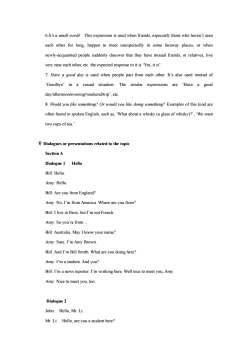
6.ltsa small worldThis expression is used whenfriends,especiallythosewhohaven't seeneach otherforlong,happen tomeetunexpectedlyinsomefaraway places,or whennewly-acquainted people suddenly discover that they have mutual friends, or relatives, livevery near each other, etc. the expected response to it is “Yes, it is.7. Have a good day is used when people part from each other. It's also used instead ofGoodbye"in a casual situation.Thesimilar expressionsareHavegoodaday/afternoon/evening/weekend/trip,etc.8. Would you like something? Or would you like doing something? Examples of this kind areoften found in spoken English, such as, What about a whisky (a glass of whisky)?", We wanttwo cups of tea.V Dialogues or presentations related to the topicSectionADialogue1HelloBill: Hello.Amy: Hello.Bill: Are you from England?Amy:No, I'm from America. Where are you from?Bill: I live in Paris, but I'm not FrenchAmy. So you're from...Bill: Australia. May I know your name?Amy: Sure. I'm Amy Brown.Bill: And I'm Bill Smith. What are you doing here?Amy: I'm a student. And you?Bill: I'm a news reporter. I'm working here. Well nice to meet you, AmyAmy: Nice to meet you, tooDialogue 2John:Hello, Mr. Li.Mr. Li:Hello, are you a student here?
6.It’s a small world This expression is used when friends, especially those who haven’t seen each other for long, happen to meet unexpectedly in some faraway places, or when newly-acquainted people suddenly discover that they have mutual friends, or relatives, live very near each other, etc. the expected response to it is ‘Yes, it is’. 7. Have a good day is used when people part from each other. It’s also used instead of ‘Goodbye’ in a casual situation. The similar expressions are ‘Have a good day/afternoon/evening/weekend/trip’, etc. 8. Would you like something? Or would you like doing something? Examples of this kind are often found in spoken English, such as, ‘What about a whisky (a glass of whisky)?’, ‘We want two cups of tea.’ Ⅴ Dialogues or presentations related to the topic Section A Dialogue 1 Hello Bill: Hello. Amy: Hello. Bill: Are you from England? Amy: No, I’m from America. Where are you from? Bill: I live in Paris, but I’m not French. Amy: So you’re from. Bill: Australia. May I know your name? Amy: Sure. I’m Amy Brown. Bill: And I’m Bill Smith. What are you doing here? Amy: I’m a student. And you? Bill: I’m a news reporter. I’m working here. Well nice to meet you, Amy. Amy: Nice to meet you, too. Dialogue 2 John: Hello, Mr. Li. Mr. Li: Hello, are you a student here?
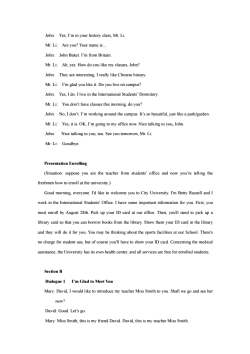
John:Yes, I'm inyour history class, Mr.Li.Mr. Li:Are you? Your name is...John:John Baker. I'm from BritainMr. Li.Ah, yes. How do you like my classes, John?John:They are interesting. I really like Chinese historyMr. Li:I'm glad you like it. Do you live on campus?John:Yes, I do. I live in the International Students'DormitoryMr. Li:You don't have classes this morning, do you?John:No,I don't. I'm working around the campus. It's so beautiful, just like a park/garden.Mr. Li.Yes, it is.OK, I'mgoing to my office now.Nice talking to you,JohnJohn:Nice talking to you, too. See you tomorrow, Mr. Li.Mr. Li:Goodbye.Presentation Enrolling(Situation: suppose you are the teacher from students'office and now you're telling thefreshmen how to enroll at the university.)Good morning. everyone. I'd like to welcome you to City University. I'm Betty Russell and Iwork in the International Students' Office.I have some important information for you. First, youmust enroll by August 28th. Pick up your ID card at our office. Then, youll need to pick up alibrary card so that you can borrow books from the library. Show them your ID card in the libraryand they will do it for you. You may be thinking about the sports facilities at our School. There'sno charge for student use, but of course you'll have to show your ID card. Concerning the medicalassistance, the University has its own health center,and all services are freefor enrolled students.Section BDialogue1I'm Gladto Meet YouMary: David, I would like to introduce my teacher Miss Smith to you. Shall we go and see hernow?David: Good. Let's go.Mary: Miss Smith, this is my friend David. David, this is my teacher Miss Smith
John: Yes, I’m in your history class, Mr. Li. Mr. Li: Are you? Your name is. John: John Baker. I’m from Britain. Mr. Li: Ah, yes. How do you like my classes, John? John: They are interesting. I really like Chinese history. Mr. Li: I’m glad you like it. Do you live on campus? John: Yes, I do. I live in the International Students’ Dormitory. Mr. Li: You don’t have classes this morning, do you? John: No, I don’t. I’m working around the campus. It’s so beautiful, just like a park/garden. Mr. Li: Yes, it is. OK, I’m going to my office now. Nice talking to you, John. John: Nice talking to you, too. See you tomorrow, Mr. Li. Mr. Li: Goodbye. Presentation Enrolling (Situation: suppose you are the teacher from students’ office and now you’re telling the freshmen how to enroll at the university.) Good morning, everyone. I'd like to welcome you to City University. I'm Betty Russell and I work in the International Students' Office. I have some important information for you. First, you must enroll by August 28th. Pick up your ID card at our office. Then, you'll need to pick up a library card so that you can borrow books from the library. Show them your ID card in the library and they will do it for you. You may be thinking about the sports facilities at our School. There's no charge for student use, but of course you'll have to show your ID card. Concerning the medical assistance, the University has its own health center, and all services are free for enrolled students. Section B Dialogue 1 I’m Glad to Meet You Mary: David, I would like to introduce my teacher Miss Smith to you. Shall we go and see her now? David: Good. Let’s go. Mary: Miss Smith, this is my friend David. David, this is my teacher Miss Smith
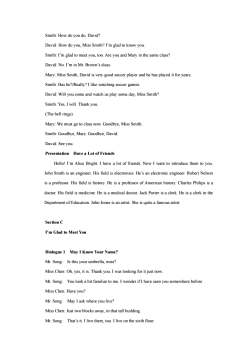
Smith: How do you do, David?David: How do you, Miss Smith?I'mglad to know youSmith: I'm glad to meet you, too.Are you and Mary in the same class?David: No. I'm in Mr. Brown's class.Mary: Miss Smith, David is very good soccer player and he has played it for years.Smith:Hashe?/Really?Ilike watching soccer games.David:Will you comeand watch us play someday, Miss Smith?Smith: Yes, I will, Thank you.(The bell rings)Mary:We must go to class now.Goodbye, Miss SmithSmith: Goodbye, Mary. Goodbye, David:David: See youl.Presentation Have a Lot of FriendsHello! I'm Alice Bright. I have a lot of friends. Now I want to introduce them to youJohn Smith is an engineer. His field is electronics. He's an electronic engineer. Robert Nelsoris a professor. His field is history. He is a professor of American history. Charles Philips is adoctor. His field is medicine. He is a medical doctor. Jack Porter is a clerk, He is a clerk in theDepartment of Education.John Jones is an artist.She is quite afamous artistSectionCI'm Glad to Meet YouDialogue1MayIKnowYourName?Mr. Song:Is this your umbrella, miss?Miss Chen: Oh, yes, it is. Thank you. I was looking for it just nowMr.Song:You look a bit familiar to me.I wonder ifIhave seen you somewhere beforeMiss Chen: Have you?Mr. SongMay I ask where you live?Miss Chen: Just two blocks away, in that tall building.Mr. Song:That's it, I live there, too. I live on the sixth floor
Smith: How do you do, David? David: How do you, Miss Smith? I’m glad to know you. Smith: I’m glad to meet you, too. Are you and Mary in the same class? David: No. I’m in Mr. Brown’s class. Mary: Miss Smith, David is very good soccer player and he has played it for years. Smith: Has he?/Really? I like watching soccer games. David: Will you come and watch us play some day, Miss Smith? Smith: Yes, I will. Thank you. (The bell rings) Mary: We must go to class now. Goodbye, Miss Smith. Smith: Goodbye, Mary. Goodbye, David: David: See you. Presentation Have a Lot of Friends Hello! I’m Alice Bright. I have a lot of friends. Now I want to introduce them to you. John Smith is an engineer. His field is electronics. He’s an electronic engineer. Robert Nelson is a professor. His field is history. He is a professor of American history. Charles Philips is a doctor. His field is medicine. He is a medical doctor. Jack Porter is a clerk. He is a clerk in the Department of Education. John Jones is an artist. She is quite a famous artist. Section C I’m Glad to Meet You Dialogue 1 May I Know Your Name? Mr. Song: Is this your umbrella, miss? Miss Chen: Oh, yes, it is. Thank you. I was looking for it just now. Mr. Song: You look a bit familiar to me. I wonder if I have seen you somewhere before Miss Chen: Have you? Mr. Song: May I ask where you live? Miss Chen: Just two blocks away, in that tall building. Mr. Song: That’s it. I live there, too. I live on the sixth floor
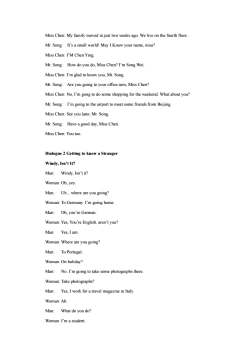
Miss Chen:Myfamilymoved in justtwoweeksago.We live on thefourth floor.Mr.Song:It'sa small world!MayI Knowyourname,miss?Miss Chen: I'M Chen Ying.Mr.Song:Howdoyoudo,MissChen?I'mSongWeiMiss Chen: I'm glad to know you, Mr. Song.Mr. Song.Are you going to your office now, Miss Chen?Miss Chen: No, I'm gong to do some shopping for the weekend. What about you?Mr. Song:I'm going to the airport to meet some friends from Beijing.Miss Chen: See you later, Mr. Song.Mr.Song:Haveagood day,MissChenMiss Chen: You too.Dialogue2Gettingtoknowa StrangerWindy, Isn't It?Man:Windy, Isn't it?Woman: Oh, yes.Man:Uh... where are you going?Woman: To Germany. I'm going home.Man:Oh,you're GermanWoman: Yes, You're English, aren't you?Man:Yes, I am.Woman: Where are you going?Man:To Portugal.Woman: On holiday?Man:No. I'm going to take some photographs there.Woman: Take photographs?Man:Yes, I work for a travel magazine in Italy.Woman: Ah.Man:What do you do?Woman:I'm a student
Miss Chen: My family moved in just two weeks ago. We live on the fourth floor. Mr. Song: It’s a small world! May I Know your name, miss? Miss Chen: I’M Chen Ying. Mr. Song: How do you do, Miss Chen? I’m Song Wei. Miss Chen: I’m glad to know you, Mr. Song. Mr. Song: Are you going to your office now, Miss Chen? Miss Chen: No, I’m gong to do some shopping for the weekend. What about you? Mr. Song: I’m going to the airport to meet some friends from Beijing. Miss Chen: See you later, Mr. Song. Mr. Song: Have a good day, Miss Chen. Miss Chen: You too. Dialogue 2 Getting to know a Stranger Windy, Isn’t It? Man: Windy, Isn’t it? Woman: Oh, yes. Man: Uh.where are you going? Woman: To Germany. I’m going home. Man: Oh, you’re German. Woman: Yes, You’re English, aren’t you? Man: Yes, I am. Woman: Where are you going? Man: To Portugal. Woman: On holiday? Man: No. I’m going to take some photographs there. Woman: Take photographs? Man: Yes, I work for a travel magazine in Italy. Woman: Ah. Man: What do you do? Woman: I’m a student
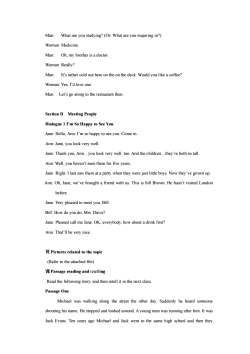
Man:What are you studying? (Or: What are you majoring in?)Woman: MedicineMan:Oh, my brother is a doctor.Woman:Really?Man:It's rather cold out here on the on thedeck.Would you like a coffee?Woman: Yes, I'd love one.Man:Let's go along to the restaurantthenSectionDMeetingPeopleDialogue1 I'm So Happy to See YouJane: Hello, Ann. I'm so happy to see you. Come in.Ann: Jane, you look very well.Jane: Thank you, Ann...you look very well, too. And the children...they're both so tallAnn: Well, you haven't seen them for five years.Jane:Right. I last saw them at a party when they were just little boys.Now they've grown upAnn: Oh, Jane, we've brought a friend with us. This is bill Brown, He hasn't visited Londonbefore.Jane: Very pleased to meet you, BillBill: How do you do, Mrs. Davis?Jane:Pleased callme Jane.OK,everybody,howabout adrinkfirst?Ann: That'll be very nice.VI Pictures related to the topic(Refer to the attached file)VI Passage reading and retellingRead the following story, and then retell it in the next class.Passage OneMichael was walking along the streetthe otherday.Suddenlyhe heard someoneshouting his name.He stopped and looked around.A young man was running after him,It wasJack Evans.Ten years agoMichael and Jack wentto the samehigh school and thenthey
Man: What are you studying? (Or: What are you majoring in?) Woman: Medicine. Man: Oh, my brother is a doctor. Woman: Really? Man: It’s rather cold out here on the on the deck. Would you like a coffee? Woman: Yes, I’d love one. Man: Let’s go along to the restaurant then. Section D Meeting People Dialogue 1 I’m So Happy to See You Jane: Hello, Ann. I’m so happy to see you. Come in. Ann: Jane, you look very well. Jane: Thank you, Ann.you look very well, too. And the children.they’re both so tall. Ann: Well, you haven’t seen them for five years. Jane: Right. I last saw them at a party when they were just little boys. Now they’ve grown up. Ann: Oh, Jane, we’ve brought a friend with us. This is bill Brown. He hasn’t visited London before. Jane: Very pleased to meet you, Bill. Bill: How do you do, Mrs. Davis? Jane: Pleased call me Jane. OK, everybody, how about a drink first? Ann: That’ll be very nice. Ⅵ Pictures related to the topic (Refer to the attached file) Ⅶ Passage reading and retelling Read the following story, and then retell it in the next class. Passage One Michael was walking along the street the other day. Suddenly he heard someone shouting his name. He stopped and looked around. A young man was running after him. It was Jack Evans. Ten years ago Michael and Jack went to the same high school and then they
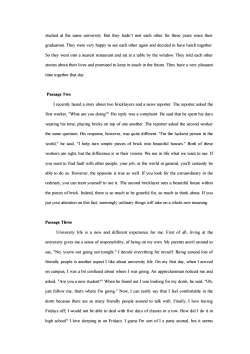
studied at the same university.But they hadn't met each other for three years since theirgraduation. They were very happy to see each other again and decided to have lunch together.So they went into a nearest restaurant and sat at a table by the window. They told each othestories about their lives and promised to keep in touch in the future.They have a very pleasanttime together that dayPassageTwoI recently heard a story about two bricklayers and a news reporter.The reporter asked thefirst worker, "What are you doing?" His reply was a complaint. He said that he spent his dayswasting his time,placing bricks on top of one another.The reporter asked the second workerthe samequestion.His response,however,was quite different."I'm the luckiestperson in theworld,"he said, "I help turn simple pieces of brick into beautiful houses."Both of theseworkers are right, but the difference is in their visions. We see in life what we want to see.Ifyou want to find fault with otherpeople,your job, or theworld ingeneral,you'll certainlybeable to do so. However, the opposite is true as well. If you look for the extraordinary in theordinary,you can train yourself to see it. The second bricklayer sees a beautiful house withinthe pieces of brick.Indeed, there is so much to be gratefulfor, so much to think about.If youput your attention on this fact, seemingly ordinary things will take on a whole new meaningPassageThreeUniversity life is a new and different experience for me. First of all, living at theuniversitygives me a sense of responsibility,of being on my own.My parents aren't around tosay,"No, you're not going out tonight."I decide everything for myself. Being around lots offriendly people is another aspectI like about university life.On my first day,when I arrivedon campus, I was a bit confused about where I was going. An upperclassman noticed me andasked,"Are you a new student?" When he found out I was looking for my dorm, he said, "Oh,just follow me; that's where I'm going" Now, I can really say that I feel comfortable in thedorm because there are so many friendly people around to talk with.Finally,I love havingFridays off,I would not be able to deal with five days of classes in arow.How did I do it inhigh school?I love sleeping in on Fridays.I guess I'm sort of I a party animal, but it seems
studied at the same university. But they hadn’t met each other for three years since their graduation. They were very happy to see each other again and decided to have lunch together. So they went into a nearest restaurant and sat at a table by the window. They told each other stories about their lives and promised to keep in touch in the future. They have a very pleasant time together that day. Passage Two I recently heard a story about two bricklayers and a news reporter. The reporter asked the first worker, "What are you doing?" His reply was a complaint. He said that he spent his days wasting his time, placing bricks on top of one another. The reporter asked the second worker the same question. His response, however, was quite different. "I'm the luckiest person in the world," he said, "I help turn simple pieces of brick into beautiful houses." Both of these workers are right, but the difference is in their visions. We see in life what we want to see. If you want to find fault with other people, your job, or the world in general, you'll certainly be able to do so. However, the opposite is true as well. If you look for the extraordinary in the ordinary, you can train yourself to see it. The second bricklayer sees a beautiful house within the pieces of brick. Indeed, there is so much to be grateful for, so much to think about. If you put your attention on this fact, seemingly ordinary things will take on a whole new meaning. Passage Three University life is a new and different experience for me. First of all, living at the university gives me a sense of responsibility, of being on my own. My parents aren't around to say, "No, you're not going out tonight." I decide everything for myself. Being around lots of friendly people is another aspect I like about university life. On my first day, when I arrived on campus, I was a bit confused about where I was going. An upperclassman noticed me and asked, "Are you a new student?" When he found out I was looking for my dorm, he said, "Oh, just follow me; that's where I'm going." Now, I can really say that I feel comfortable in the dorm because there are so many friendly people around to talk with. Finally, I love having Fridays off; I would not be able to deal with five days of classes in a row. How did I do it in high school? I love sleeping in on Fridays. I guess I'm sort of I a party animal, but it seems

like I go out every Thursday night. It also seems like I don't get home until early the next day!My head hits the pillow and I don't move until Friday afternoon. (210 words)
like I go out every Thursday night. It also seems like I don't get home until early the next day! My head hits the pillow and I don't move until Friday afternoon. (210 words)
按次数下载不扣除下载券;
注册用户24小时内重复下载只扣除一次;
顺序:VIP每日次数-->可用次数-->下载券;
- 《大学英语》课程PPT教学课件(口语一)Unit Four Family love.ppt
- 《大学英语》课程PPT教学课件(口语一)Unit Five Calamites & Rescue.ppt
- 《大学英语》课程PPT教学课件(口语一)Unit Eight Holiday.ppt
- 《大学英语》课程试卷习题(大学英语四级【CET-4】历年真题大全,1989-2007年39套,含参考答案).docx
- 《大学英语》课程参考资料(作文写作)应试技巧-阅读理解.doc
- 《大学英语》课程参考资料(作文写作)U.S. to Start $3.2 Billion Child Health Study in January.doc
- 《大学英语》课程参考资料(作文写作)Calling for Safe Celebrations This Fourth of July.doc
- 《大学英语》课程参考资料(作文写作)Life Aichi University.doc
- 《大学英语》课程参考资料(作文写作)Older Volcanic Eruptions.doc
- 《大学英语》课程参考资料(作文写作)Immigration and Problem.doc
- 《大学英语》课程参考资料(作文写作)Declining Interest in Developing Foreign Language Skills.doc
- 《大学英语》课程参考资料(作文写作)Hair Detectives.doc
- 《大学英语》课程参考资料(作文写作)Medicine Award Kicks off Nobel Prize Announcements.doc
- 《大学英语》课程参考资料(作文写作)Online Cancer Chat with a Safety Net.doc
- 《大学英语》课程参考资料(作文写作)Road Trip Vacations.doc
- 《大学英语》课程参考资料(作文写作)Listening to Birdsong.doc
- 《大学英语》课程参考资料(作文写作)Light Night, Dark Stars.doc
- 《大学英语》课程参考资料(作文写作)Putting Plants to Work.doc
- 《大学英语》课程参考资料(作文写作)Mind-reading Machine.doc
- 《大学英语》课程参考资料(作文写作)Million Americans Suffer from Social Anxiety Disorder.doc
- 《大学英语》课程PPT教学课件(口语一)Unit Seven Generation gap.ppt
- 《大学英语》课程PPT教学课件(口语一)Unit Six Music.ppt
- 《大学英语》课程PPT教学课件(口语一)Unit Three Cellphone.ppt
- 《大学英语》课程PPT教学课件(口语一)Unit Two Learning online.ppt
- 《大学英语》课程PPT教学课件(口语二)口语第七次.ppt
- 《大学英语》课程PPT教学课件(口语二)口语第六次.ppt
- 《大学英语》课程PPT教学课件(口语二)口语第九次.ppt
- 《大学英语》课程PPT教学课件(口语二)口语第二次.ppt
- 《大学英语》课程PPT教学课件(口语二)口语第八次.ppt
- 《大学英语》课程PPT教学课件(口语二)口语第一次.ppt
- 《大学英语》课程PPT教学课件(口语二)口语第五次.ppt
- 《大学英语》课程PPT教学课件(口语二)口语第四次.ppt
- 《大学英语》课程PPT教学课件(口语二)口语第三次.ppt
- 《大学英语》课程PPT教学课件(口语二)口语第十次.ppt
- 《大学英语》课程PPT教学课件(翻译)第七章 省略法.ppt
- 《大学英语》课程PPT教学课件(翻译)翻译第三周.ppt
- 《大学英语》课程PPT教学课件(翻译)翻译第四周.ppt
- 《大学英语》课程PPT教学课件(翻译)英汉翻译第一周.ppt
- 《大学英语》课程PPT教学课件(翻译)英语翻译第二周 课件.ppt
- 《大学英语》课程PPT教学课件(翻译)第11周 语态变换法.ppt
